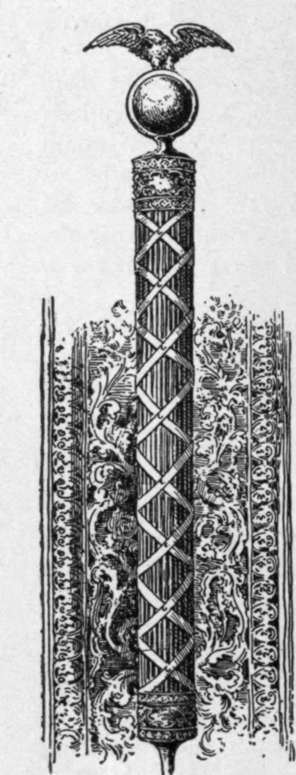Great Mace
Description
This section is from the book "The National Capitol. Its Architecture Art And History", by George C. Hazelton, Jr. Also available from Amazon: The National Capitol Its Architecture Art and History.
Great Mace
Among the official duties of the Sergeant-at-Arms rests also the care of the Great Mace. This time-honored emblem of authority is composed of thirteen ebony sticks, silver-bound and surmounted by a silver globe, delicately engraved with the map of the world, upon the top of which rests a silver eagle with wings outstretched. A few minutes before the assembling of the House, it is the duty of an assistant Sergeant-at-Arms to carry the mace to the floor and rest it on the platform, prepared for that purpose, against the wall beside the Speaker. When the Chaplain finishes the benediction, the Speaker declares the House in session, and the mace is raised and placed upon its immovable pedestal of malachite, where it remains until the House adjourns. The assistant Sergeant-at-Arms then formally bears it back and replaces it in the custody of his superior.
The House is not always an orderly body. This was especially so in war times. Indeed, as late as August 27, 1890, Mr. Enloe appropriately asked the Speaker if it would not " be in order to substitute the Marquis of Queens-berry rules for the rules of the House and proceed to do business"? The question of enforcing order is a vital one, and two Members are reported as once saying defiantly: "Let them try it." Whenever during sessions the House becomes too turbulent for the Speaker to control, he directs the Sergeant-at-Arms to take the mace from its pedestal and cany it among the Members. It has been upon the rarest occasions only that this authority has not been immediately respected.

Continue to:
